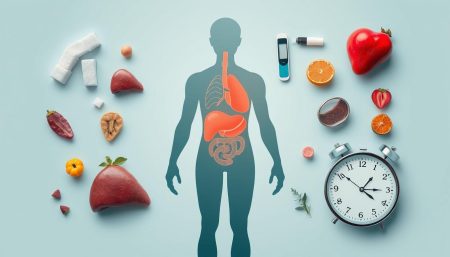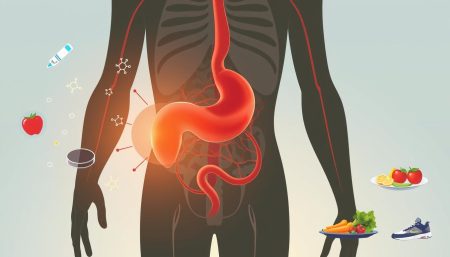Diabetes Mellitus is a big deal in health and wellness. It affects millions worldwide. It’s when your blood sugar, or glucose, is too high.
The Centers for Disease Control and Prevention explain it well. Diabetes is a group of metabolic disorders. They make it hard to control blood sugar levels for a long time.
Diabetes is sneaky and affects many people. Knowing about it is key to stopping its bad effects. The World Health Organization says diabetes can lead to heart disease, stroke, and kidney failure.
So, understanding diabetes is important. It helps us talk about keeping healthy and avoiding diseases.
The Mayo Clinic says knowing about diabetes is powerful. This article aims to make diabetes easier to understand. It’s for those who want to learn about this important health issue.
Introduction to Diabetes Mellitus
Diabetes mellitus is a big problem worldwide, affecting millions. It’s important to know the diabetes symptoms and how to manage blood sugar levels. This introduction gives a detailed look at diabetes mellitus, using information from top health journals and organizations like the American Diabetes Association.
Diabetes mellitus is a group of diseases with high blood sugar levels for a long time. This happens when the body doesn’t make enough insulin or can’t use it well. We’ll look at common diabetes symptoms and why keeping an eye on blood sugar levels is key.
- Elevated thirst and frequent urination
- Increased hunger
- Weight loss or gain that has no obvious cause
- Fatigue
- Blurred vision
- Slow-healing wounds or frequent infections
- Numbness or tingling in the feet or hands
The problem of diabetes mellitus is huge, with more cases every year. Governments and health groups are working hard to find better ways to diagnose and treat it. The table below shows how diabetes affects different parts of the world, highlighting the need for specific health plans.
| Region | Prevalence of Diabetes (% of Population) | Year |
|---|---|---|
| North America | 10.5% | 2021 |
| Western Europe | 7.8% | 2021 |
| Asia-Pacific | 12.3% | 2021 |
| Africa | 4.9% | 2021 |
Diabetes Mellitus is more than a health issue; it’s a global challenge. We need to understand and act on it from all angles. This section is just the start of exploring how diabetes affects us all and why we must stay vigilant and find new ways to manage it.
Defining What is Diabetes Mellitus Disease
Diabetes Mellitus is a complex disease that affects how the body controls blood sugar. It is mainly split into type 1 and type 2 diabetes. Type 1 is caused by the body attacking its insulin-making cells. Type 2 is linked to insulin resistance, often due to lifestyle choices.
The Basics of Diabetes Mellitus
Diabetes Mellitus happens when the pancreas can’t make enough insulin or when the body can’t use insulin well. Insulin is key for moving glucose into cells to make energy. Without it, glucose builds up in the blood, showing diabetes symptoms.
Differentiating Between Types of Diabetes
It’s important to know the differences between type 1 and type 2 diabetes. Type 1 is an autoimmune disease where the body attacks insulin-making cells. Type 2, on the other hand, is often caused by lifestyle choices and is more common in adults, but also seen in younger people.
| Characteristic | Type 1 Diabetes | Type 2 Diabetes |
|---|---|---|
| Cause | Autoimmune | Insulin resistance, often lifestyle-related |
| Onset | Typically childhood/young adults | Generally in adults, but increasing in younger demographics |
| Management | Insulin injections mandatory | Lifestyle changes, medication, sometimes insulin |
| Prevalence | Less common | More common |
Knowing these differences is key for proper treatment and patient education. It helps tailor care for each type of diabetes, whether it’s autoimmune type 1 or insulin resistance in type 2.
Breaking Down Type 1 Diabetes
Type 1 diabetes is a severe form of diabetes. It happens when the body’s immune system attacks and destroys insulin-producing cells in the pancreas. This usually affects children and young adults, who must manage it with insulin and other treatments for life.
Cause and Development of Type 1 Diabetes
Type 1 diabetes often starts suddenly, mainly in kids and teens. It’s caused by an autoimmune reaction that damages the pancreas’s beta cells. These cells make insulin, so when they’re destroyed, the body can’t control blood sugar levels.
Managing Type 1 Diabetes Through Lifestyle
Managing type 1 diabetes involves medication, diet, and lifestyle changes. Insulin therapy is key, but diet and exercise are also vital. Eating right and staying active help keep blood sugar stable and prevent complications.
Understanding Type 2 Diabetes
Type 2 diabetes is becoming more common. Many people don’t know how it’s linked to insulin resistance and diabetes symptoms. This part talks about how lifestyle affects type 2 diabetes and why catching it early is key.
Type 2 diabetes takes years to develop. It’s caused by lifestyle and genetics. A big part of it is insulin resistance. This means the body’s cells can’t use insulin well, causing blood sugar to rise.
- Common Symptoms: Feeling thirsty, needing to pee a lot, being hungry, tired, and seeing things blurry.
- Risk Factors: Being overweight, not moving much, having a family history, and high blood pressure.
- Preventive Measures: Eating right, staying active, and keeping a healthy weight.
Knowing about these factors helps manage diabetes symptoms and fight insulin resistance. Regular health checks and changing your lifestyle are key to controlling the disease.
| Type 2 Diabetes Factor | Impact | Management Strategy |
|---|---|---|
| Insulin Resistance | High blood sugar levels | Diet and exercise |
| Lifestyle Factors | Increased risk of development | Lifestyle modifications |
| Genetic Predisposition | Higher susceptibility | Regular health screenings |
It’s vital to spot diabetes symptoms early. Early action can change the disease’s course. Raising awareness about type 2 diabetes helps people manage it better and live healthier lives.
Causes of Diabetes Mellitus
Looking into the causes of diabetes mellitus shows how genetic predisposition and lifestyle factors work together. This part explains how these elements raise the risk of getting diabetes. Sources like Genetics in Medicine, Diabetes & Metabolism Journal, and Obesity Reviews shed light on their importance.
Genetic Factors in Diabetes
Genetics are key in type 2 diabetes. Studies from Genetics in Medicine show that family history matters. This means early checks and genetic advice are vital for those at risk.
Lifestyle Choices Leading to Diabetes
Lifestyle habits, as found in Diabetes & Metabolism Journal, greatly impact diabetes risk. Bad diet, not moving enough, and being overweight are big issues. Obesity Reviews points out that exercise and healthy eating can help counter genetic risks.
| Risk Factor | Impact on Diabetes Risk | Preventative Measures |
|---|---|---|
| Genetic Predisposition | High | Genetic counseling, Early screening |
| Poor Diet | Very High | Balanced diet, Reduced sugar intake |
| Lack of Physical Activity | High | Regular exercise, Fitness programs |
| Obesity | Very High | Weight management, Dietary adjustments |
Physical Manifestations: Recognizing Diabetes Symptoms
It’s important to know the diabetes symptoms early. People might feel very thirsty and hungry, even after eating. They might also need to go to the bathroom a lot. This is because their high blood sugar is affecting their kidneys.
Feeling tired and weak is another sign. These symptoms can make daily life hard. They might also mean more serious diabetic complications are coming if not treated soon.
Blurred vision is a sign of diabetes that needs quick attention. It can lead to serious eye problems. Losing weight without trying can also be a sign of diabetes.
Spotting these symptoms early is key to managing diabetes. If you notice them, see a doctor right away. This is the first step to prevent serious problems.
| Diabetes Symptom | Associated Risk |
|---|---|
| Excessive thirst and urination | High risk of dehydration and kidney stress |
| Fatigue and weakness | Impaired ability to perform daily tasks effectively |
| Blurred vision | Potential risk of permanent vision loss |
| Unplanned weight loss | Indicative of improper glucose metabolism |
Being aware of these symptoms helps manage health. It’s important to watch for them and get regular check-ups. This can improve health and quality of life for people with diabetes.
Comprehensive Guide to Diabetes Diagnosis
It’s important to know how diabetes is diagnosed to manage it well. This part explains the main tools used to find out if you have diabetes. We’ll look closely at the blood sugar test and the A1C test. These are key in diagnosing and keeping track of diabetes.
Blood Tests to Diagnose Diabetes Mellitus
Blood tests are key in finding out if you have diabetes. The fasting blood glucose test checks your blood sugar after you haven’t eaten for a while. The random blood glucose test can be done at any time. These tests show if your blood sugar is too high, which means you might have diabetes.
The Role of A1C in Diabetes Diagnosis
The A1C test is also very important for diagnosing diabetes. It shows your average blood sugar levels over two to three months. If your A1C is 6.5% or higher on two tests, you likely have diabetes. This test is great because you don’t have to fast and it shows your sugar levels over time. It helps find diabetes early and manage it better.
Getting diabetes diagnosed early is very important. Tests like the blood sugar test and A1C test help with this. Early detection lets people manage their diabetes well. This reduces the risk of serious problems from high blood sugar.
Monitoring Blood Sugar Levels
Managing diabetes well means keeping an eye on blood sugar levels. This is key to staying healthy and avoiding serious problems. Today, we have many tools that make it easier and more accurate to track blood sugar.
Understanding Blood Sugar Ranges
It’s important to know what blood sugar levels should be. These levels can change based on your diabetes type, age, and health. Keeping your blood sugar in the right range helps avoid short and long-term health problems.
Tools for Tracking Blood Glucose
We have many ways to track blood sugar today. From simple glucose meters to advanced continuous glucose monitoring systems, there’s something for everyone. Let’s explore these important tools:
- Glucose Meters: These are small and easy to use. They give quick blood sugar readings from just a tiny blood sample.
- Continuous Glucose Monitoring (CGM): CGMs show your glucose levels all day and night. They catch changes that regular tests might miss.
Choosing between these tools depends on your lifestyle, budget, and doctor’s advice.
| Feature | Glucose Meter | Continuous Glucose Monitoring |
|---|---|---|
| Sampling Frequency | On-demand | Continuous |
| Data Provided | Single reading | 24/7 glucose trends |
| Usage Simplicity | High | Medium |
| Cost-effectiveness | Generally more affordable | Higher initial cost, potentially more economical long term |
Implications of Insulin Resistance
Insulin resistance is a serious condition that can lead to type 2 diabetes and metabolic syndrome. Knowing how it works and its effects is key to managing it. This part will look at the main causes, links, and health impacts of insulin resistance.
What Causes Insulin Resistance?
Genetics and lifestyle choices are big factors in insulin resistance. Diet, exercise, and weight are just as important. Eating too much fat and sugar and not moving enough raises your risk.
Staying in these conditions for a long time makes it harder for your body to use insulin. This can lead to more serious health problems.
Connecting Insulin Resistance and Diabetes
Insulin resistance often leads to type 2 diabetes. When your body can’t use insulin well, your pancreas makes more. This can wear it out and cause diabetes.
It’s also linked to metabolic syndrome. This includes high blood pressure, high blood sugar, and too much belly fat. Plus, abnormal cholesterol levels.
| Condition | Features | Impact of Insulin Resistance |
|---|---|---|
| Type 2 Diabetes | High blood sugar, insulin deficiency | Insulin resistance leads to increased blood sugar levels and possible diabetes onset. |
| Metabolic Syndrome | Combination of diabetes, high blood pressure, and obesity | Insulin resistance is a component and possible cause of metabolic syndrome. |
| Cardiovascular Disease | Heart conditions linked to poor blood flow | Increased risk due to the association between insulin resistance and abnormal cholesterol levels. |
Effective Diabetes Treatment Options
Diabetes treatment varies widely, fitting each patient’s unique needs. It’s key to focus on diabetes management in a way that works for everyone. This includes changing diets and using insulin therapy to manage the condition.
Learning about the different treatments can greatly improve life quality. For more on diabetes and hair loss, check out this link.
Creating a personalized treatment plan is vital for managing diabetes. These plans might include diet changes, pills, and insulin therapy. The right treatment depends on the type of diabetes and the patient’s health.
| Treatment Type | Benefits | Considerations |
|---|---|---|
| Dietary Changes | Improves overall health, helps control blood sugar levels | Requires consistent monitoring and adjustments |
| Oral Medications | Helps maintain blood glucose levels | May cause side effects; needs medical supervision |
| Insulin Therapy | Directly manages blood sugar, essential for type 1 diabetes | Requires education on proper dosing and administration |
Every part of diabetes treatment aims to control the disease and enhance life quality. Combining diet, medicine, and lifestyle changes is the foundation of good diabetes management.
Developing a Diabetic Diet Plan
Starting a diabetic diet is key to managing diabetes well. It involves planning meals and managing nutrition. This helps improve health. We will look at important diet tips and foods to avoid to keep blood sugar levels right.
Nutritional Guidelines for Managing Diabetes
Following the right diet can change lives for people with diabetes. A good diet focuses on controlling carbs, eating enough fiber, and watching portion sizes. This helps keep blood sugar levels in check. Key points include:
- Keeping carb intake the same at each meal to avoid blood sugar spikes.
- Eating foods high in fiber like veggies, legumes, whole grains, and nuts to help control blood sugar.
- Choosing lean proteins like chicken, fish, and tofu for essential nutrients without too much fat.
Diabetes meal planning doesn’t mean giving up. It’s about finding a balance that fits your needs, with help from a healthcare provider or nutritionist.
Foods to Avoid in a Diabetic Diet
Some foods can hurt blood sugar control and health in a diabetic diet. Avoiding them is important for managing glucose:
- Sugary drinks and snacks that raise blood sugar quickly.
- Trans fats in processed foods that can raise cholesterol.
- Too much red meat and high-fat dairy, which can make insulin resistance worse.
Choosing the right foods is vital for a successful diabetic diet. Knowing which foods to avoid is essential for good health.
Exercise: A Pillar in Diabetes Management
Adding regular exercise to your daily life is key for managing diabetes well. It helps keep your weight in check and boosts how well your body uses insulin. For those with diabetes, creating a workout plan that fits their health needs is vital for keeping blood sugar levels stable.
Impact of Exercise on Blood Sugar Levels
For people with diabetes, exercise is a smart move to better manage their condition. Studies show that it helps control blood sugar by making insulin work better. A study in Diabetes/Metabolism Research and Reviews found that activities like walking or swimming can lower blood sugar and improve health.
Creating an Exercise Routine for Diabetic Patients
For diabetic patients, mixing aerobic and strength training exercises is important. The Physical Activity Guidelines for Americans suggest at least 150 minutes of aerobic exercise weekly. Also, doing muscle-strengthening activities two or more times a week can help control blood sugar better.
- Aerobic Exercises: Brisk walking, cycling, jogging, or swimming.
- Strength Training: Using resistance bands, weight machines, or body-weight exercises like squats and push-ups.
Begin with gentle workouts and gradually make them more intense and long. This helps avoid problems like low blood sugar, which is a risk for those taking insulin. Always talk to your doctor before starting a new exercise plan to make sure it’s safe and effective.
Medications and Insulin Therapy
Managing diabetes often involves using blood glucose management strategies. These include diabetes medications and insulin treatment. These methods are key for people with changing blood sugar levels. We will look at the medicines used and the vital role of insulin in managing diabetes.
For many with diabetes, daily medicines are a big part of their treatment. These medicines help keep blood sugar levels healthy. Diabetes medications work in different ways. Some help the pancreas make more insulin, while others make insulin work better or reduce liver glucose production.
Insulin treatment is very important for type 1 diabetes patients, who can’t make insulin. It’s also used for type 2 diabetes when other medicines don’t work. Insulin helps replace the missing hormone, helping manage blood glucose levels.
| Medication Type | Function | Common Side Effects |
|---|---|---|
| Sulfonylureas | Stimulates pancreas to produce more insulin | Hypoglycemia, weight gain |
| Biguanides (Metformin) | Reduces glucose production by liver | Nausea, diarrhea |
| DPP-4 inhibitors | Improves insulin release | Joint pain, skin reaction |
| Insulin | Replaces or supplements insulin | Weight gain, injection site reactions |
The choice and mix of diabetes medications and insulin treatment depend on the individual. Factors like diabetes type, age, lifestyle, and health are considered. Regular talks with healthcare providers help create a blood glucose management plan that can change as needed.
Living with Diabetes: Lifestyle Considerations
Living with diabetes means taking care of yourself every day. It’s about more than just checking your blood sugar. It also means taking care of your mental health.
Tips for Daily Life with Diabetes
Diabetes changes how you live, from what you eat to how much you move. Here are some tips to help you manage your diabetes better:
- Eat a balanced diet with lots of fiber and less bad fats and sugars.
- Check your blood sugar often to keep it stable.
- Always carry a diabetes care kit with you. It should have your meds, insulin, and glucose monitor.
- Plan your meals and workouts to control your blood sugar better.
It’s also important to be ready for unexpected situations. A small kit with your diabetes stuff can be very helpful in emergencies.
Mental Health and Diabetes
Diabetes and mental health are closely linked. Managing diabetes every day can make you feel anxious or depressed. It’s key to include mental health in your care plan.
- See a mental health expert who knows about chronic illnesses.
- Join a support group for people with diabetes.
- Try stress-reducing activities like meditation or yoga.
Adding these tips to your daily life can improve your mental and physical health. It helps you manage your diabetes better and live a better life.
| Aspect | Strategy | Impact |
|---|---|---|
| Diet | Consistent carbohydrate intake | Maintains stable blood glucose levels |
| Monitoring | Regular glucose checks | Prevents hyperglycemia and hypoglycemia |
| Mental Health | Regular counseling sessions | Reduces anxiety and depression related to diabetes management |
By taking care of both your body and mind, you can live well with diabetes. Small changes can make a big difference in managing this condition.
Latest Research and Developments in Diabetes Care
Diabetes research is making big strides, with new discoveries that could change lives. Advances in insulin delivery technology and emerging diabetes treatments are leading the way. These breakthroughs are making diabetes management better and safer for patients.
Advancements in Insulin Delivery Systems
New insulin delivery tech is making life easier for people with diabetes. Smart pens, advanced pumps, and non-invasive methods are leading the charge. These innovations are key to making diabetes care less of a daily struggle.
New Medications on the Horizon
Researchers and drug makers are working on new diabetes treatments. These aim to offer long-term benefits with fewer side effects. With options like GLP-1 agonists and SGLT2 inhibitors, the future looks promising for diabetes patients.
| Type of Innovation | Description | Expected Impact |
|---|---|---|
| Wearable Insulin Delivery Devices | Devices that allow insulin to be administered with minimal interference in daily activities. | Improves quality of life through seamless integration into personal routines. |
| Next-Generation Glucose Monitors | Monitors that provide real-time glucose levels without the need for finger-pricking. | Facilitates immediate adjustments and precise diabetes management. |
Resources and Support for Diabetics
Living with diabetes can feel overwhelming, but there’s a lot of diabetes support out there. The American Diabetes Association (ADA) is a key resource. They offer diabetes resources like diet plans and daily routine tips. Their programs aim to help patients and caregivers manage diabetes better.
Diabetes Education and Care is another great resource. They help patients learn about managing their diabetes. They focus on the role of nutrition and exercise in keeping blood sugar levels stable. Local support groups also offer a place to share experiences and find ways to deal with diabetes.
The National Diabetes Information Clearinghouse is a go-to for the latest diabetes info. It covers treatments and research. Online forums and social networks provide a community for people with diabetes. They offer support and advice, helping individuals manage their health better.
For more on another common condition, check out the myths and facts about Attention-Deficit/Hyperactivity Disorder (ADHD). You can find a detailed look at ADHD here.
FAQ
Q: What is Diabetes Mellitus Disease?
A: Diabetes mellitus is a long-term health issue. It happens when the body can’t handle blood sugar well. There are two main types: type 1, caused by an autoimmune reaction, and type 2, linked to insulin resistance. If not managed, it can cause serious health problems.
Q: What are common diabetes symptoms to be aware of?
A: Signs of diabetes include needing to pee a lot, feeling very thirsty, and being hungry all the time. You might also feel tired, see blurry, have slow-healing sores, and lose weight without trying. If you notice these, see a doctor right away.
Q: How does type 1 diabetes differ from type 2 diabetes?
A: Type 1 diabetes is when the body attacks and destroys insulin-making cells. This leads to a lack of insulin. Type 2 diabetes is when the body’s cells don’t use insulin well, and insulin production eventually drops.
Q: What are the causes of diabetes?
A: Diabetes can be caused by genetics and family history. Lifestyle choices like a bad diet, not moving enough, and being overweight also play a part. Some health conditions and environmental factors can increase the risk too.
Q: Can lifestyle choices help in managing diabetes?
A: Yes, lifestyle changes are key in managing diabetes. Eating right, staying active, managing weight, and checking blood sugar are important. They help keep blood sugar levels in check and lower the risk of complications.
Q: What are the recommended blood sugar levels for diabetics?
A: Blood sugar levels vary based on age and health conditions. The American Diabetes Association suggests a fasting blood sugar of 80-130 mg/dL. After meals, it should be less than 180 mg/dL.
Q: How is diabetes mellitus diagnosed?
A: Doctors use blood tests to diagnose diabetes. These include the fasting plasma glucose test, the oral glucose tolerance test, and the A1C test. The A1C test shows average blood sugar levels over two to three months.
Q: What is insulin resistance and why is it important?
A: Insulin resistance means the body’s cells don’t respond well to insulin. This is a big factor in type 2 diabetes. It can also lead to metabolic syndrome and heart disease.
Q: What treatment options are available for diabetes?
A: Treatments for diabetes include lifestyle changes, blood glucose monitoring, and insulin therapy. There are also oral medications and injectable treatments. The right treatment depends on the type of diabetes and the person’s health.
Q: How can diet affect diabetes management?
A: Diet is very important for managing diabetes. Eating whole foods, fruits, vegetables, lean proteins, and healthy fats helps control blood sugar. It’s key to watch carbohydrate intake and avoid foods high in sugar and fat.
Q: Why is exercise important for people with diabetes?
A: Exercise is vital for diabetes management. It helps control weight, lowers blood sugar, and improves insulin sensitivity. It’s important to include both aerobic and resistance training and to exercise regularly.
Q: What are the latest advancements in diabetes treatment?
A: New treatments include insulin pumps, smart pens, and continuous glucose monitoring (CGM) devices. There are also new medications that help control blood sugar and reduce heart disease risk.
Q: What resources are available for people living with diabetes?
A: Many resources are available for people with diabetes. There are educational materials, support groups, diabetes education programs, and online communities. These offer support and shared experiences from others with diabetes.


















